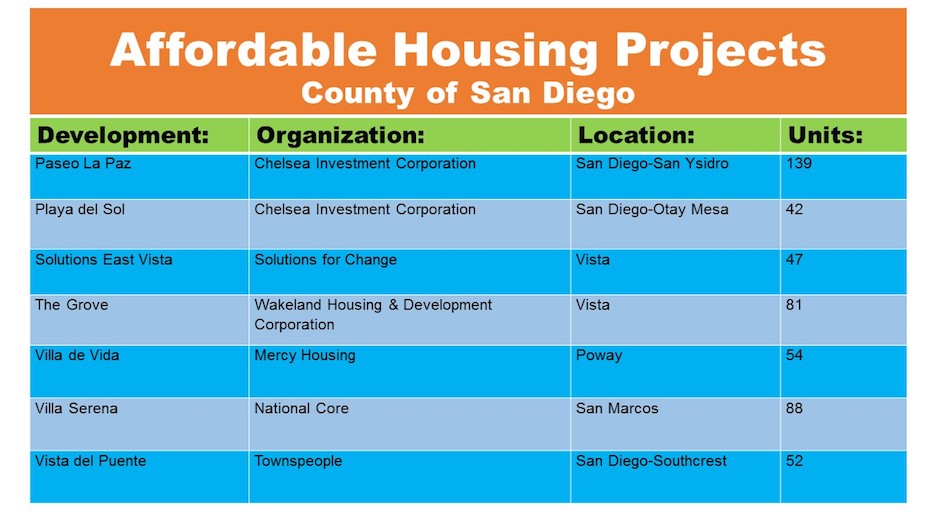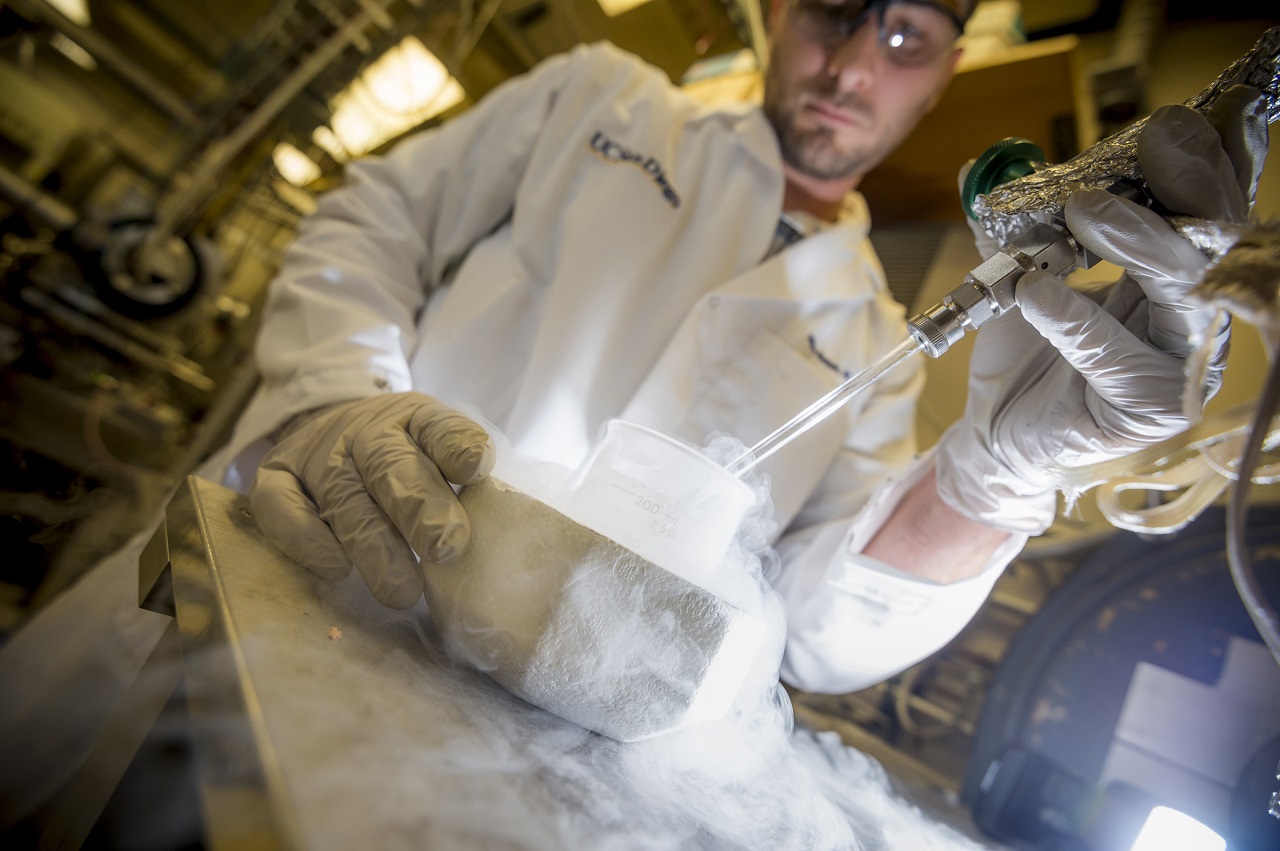Daily Business Report-Aug. 8, 2018
UC lab (Photo by Erik Jepsen, UC San Diego)
UC San Diego and UCLA led UC
system in commercializing inventions
By Kim McDonald and Michelle Franklin
UC San Diego and UCLA led the University of California system during the 2017 fiscal year in the number of commercial startups based on campus inventions, according to a report released this week by the University of California’s Office of the President.
The University of California’s Technology Commercialization Report noted that innovations in the 10-campus UC system led to a “banner year” of 96 commercial startups for the 2017 fiscal year, which ended last June, or about eight new companies each month.
UC San Diego and UCLA each produced 20 new companies each, the UC President’s Office said, “sharing the first-place position for startup formation across the entire system.”
Among the new companies started from licensed UC San Diego inventions during the past year are Neuralace Medical, which plans to deliver sustainable chronic pain relief to patients non-invasively, and Neurgain Technologies, which is developing technologies focused on the treatment of neurodegenerative diseases of the spinal cord including chronic spasticity and neuropathic pain.
In addition to the 20 startups from licensed technology cited in the UC report, UC San Diego had 23 other commercial startups created during the 2017 fiscal year, 21 of which were based on unlicensed inventions from students.
“The formation of new startups is a major contributor to the economic development and growth of the San Diego region, as well as improving our community and quality of life,” said Paul Roben, Associate Vice Chancellor for Innovation and Commercialization at UC San Diego. “Startups create new jobs and attract money to the region via their financing activities and ultimately provide an important commercial product or service.”
Inventions at UC San Diego have led to the creation of more than 770 companies, generated more than 860 U.S. patents and 1,010 foreign patents, and produced more than 400 active commercial licenses.
These innovations have helped to create some 29,200 jobs and generated $32.4 billion in economic impact to the San Diego region, based on the estimated annual sales of active UC San Diego-related companies.
____________________

Remotely piloted aircraft become
mainstay of wildland firefighting
Five years after a proof-of-concept mission, the General Atomics-built MQ-9 Reaper drone has developed into a key asset in California’s fight against wildfires, including the Carr and Mendocino Complex Fires, which are currently burning in Northern California.
“It’s a technology I never thought I’d see,” said Jeremy Salizzoni, a fire technical specialist with the California Department of Forestry and Fire Protection who was embedded with the California Air National Guard’s 163rd Attack Wing at March Air Reserve Base, California, during 2013’s devastating Rim Fire.
____________________
Appeals court rules against city attorney
in SDSU West and SoccerCity initiatives
A state appeals court has rejected San Diego City Attorney Mara Elliot’s emergency petition to remove the SDSU West and SoccerCity initiatives from the November ballot. The lower courts ruled against the city attorney in previous judgments, but a majority of the City Council voted to allow an appeal.
The three-judge panel wrote in their denial that there is an important public interest “in protecting the fundamental right of the people to propose statutory or constitutional changes through the initiative process.”
____________________

Supervisors approve $25 million
for 7 affordable housing projects
The Board of Supervisors on Tuesday authorized the county to enter into negotiations and award up to $25 million to developers for seven properties that will create 503 new units of affordable housing that will help decrease homelessness in the region.
The units from the seven housing developments will go to: homeless families; families in need; homeless veterans and with special needs; seniors and older adults with extremely low incomes; people with developmental disabilities; people with mental illness or a history of substance abuse; domestic violence survivors.
The properties will be located throughout the county in the cities of San Diego, Poway, San Marcos and Vista. Construction is expected to be completed by Dec. 2021.
“This is good news for so many families in San Diego,” said Supervisor Ron Roberts. “(The developments) are going to be extremely important in providing affordable housing.”
The Board’s vote authorizes the County’s Health and Human Services Agency to move forward with negotiations and award up to $25 million in gap funding to seven developers who responded to a Dec. 7, 2017 Notice of Funding Availability. Six others also submitted proposals.
____________________

6th & Olive mixed use project receives
Circulate Mobility Certification
Circulate San Diego has awarded its smart growth certification, the Circulate Mobility Certification, to the 6th & Olive mixed-use project from Greystar.
Located in Bankers Hill, the 6th & Olive project earned the certification for proposing a 204-unit residential building, including 18 affordable units, in close proximity to transit routes and other amenities. In addition to the 204 rental units, there is a 10,500 square foot proposed courtyard that will be available to the public, nestled between the existing St. Paul’s Cathedral and the proposed development.
The planned mixed-use residential building is a five- to six-minute walk to the adjacent bus transit stops with key destination points to various employment centers, including Hillcrest and SDSU. By bike, residents will use the 4th and 5th Avenue bikeways to reach Hillcrest in 6 minutes, or could commute by bike into Downtown’s employment center in 10 minutes or less. This project will provide 8 short-term and 107 long-term bicycle parking spaces for its residential and non-residential users to support alternative modes of transportation.
____________________

Bastille Day security enhanced by
General Atomics’ MQ-9 Reaper RPA
The French Air Force operated two of its MQ-9 Reapers simultaneously in support of France’s Bastille Day events, one over Paris and the second over Cognac, on July 14. The “French Reapers,” Remotely Piloted Aircraft (RPA) built by General Atomics Aeronautical Systems Inc. assisted French authorities by providing airborne surveillance over the national celebration.
The French Air Force benefits from permanent corridor systems connecting all military-dedicated airspace, which enabled the RPA to access restricted areas created over Paris for the Bastille Day celebrations. MQ-9 Reaper flew safely over a populated area of seven million people, among numerous other military aircraft participating in the airborne parade
Last year, France received its second MQ-9 Reaper system, consisting of three aircraft and a ground control station. Two French MQ-9’s are based in Cognac Châteaubernard Air Base, where they perform daily training or ISR support to interministerial missions in French airspace. The 1/33 Belfort RPA squadron currently operates six Reaper RPA to provide intelligence and support capabilities to Operation Barkhane and the Special Forces.
The French Reaper fleet has flown some 21,000 flight hours to date. By the end of 2019, the French Air Force says it will have 12 MQ-9s operated in shifts by 30 crews.
____________________
SDSU ranked among nation’s best colleges
San Diego State University has been named one of the country’s top colleges by The Princeton Review. SDSU’s two-page profile within the college guide notes the university’s continuation and graduation rates. Eighty-nine percent of SDSU’s freshmen students return as sophomores, and roughly 75 percent of first-time freshmen graduate in six years or less.
Published annually since 1992, the college guide provides detailed profiles of colleges with rating scores in eight categories, including academics, financial aid and overall quality of life on campus. The list is based on surveys of 138,000 students at the 384 top colleges that represent wide representation by region, size, selectivity and character.
____________________
Council confirms mayor’s appointments
to San Diego Housing Commission board
Ryan Clumpner, a public policy and communications professional, and Johanna Puno Hester, a labor leader, have been appointed to the San Diego Housing Commission (SDHC) Board of Commissioners. The San Diego City Council unanimously confirmed Mayor Kevin L. Faulconer’s appointments on Tuesday. Clumpner fills the seat previously held by Commissioner Ben Moraga, and Hester fills the seat previously held by Vice Chair Dorothy Surdi.
A Mission Hills resident in San Diego City Council District 3, Clumpner has worked in public policy and communications for 15 years. He has held a variety of positions, including chief of staff, for elected officials in the state Assembly and the San Diego City Council.
Hester, the assistant executive director of the United Domestic Workers of America/American Federation of State County and Municipal Employees (AFCSME) Local 3930, has helped thousands of working people gain a livable wage and rights in the workplace. Shehelped lead negotiations that assisted displaced residents of Penasquitos Village to obtain resources.
____________________
Personnel Announcements
Jeannie Posner joins San Diego Opera
Jeannie Posner has been appointed chief financial officer for the San Diego Opera. The CFO reports to the general director and has the day-to-day responsibility for planning, implementing, managing and controlling all financially related activities of San Diego Opera. Posner is the principal financial officer of the organization, reporting regularly to the Board of Directors and serving as the management liaison to the Finance, Audit, and Investment Committees. She manages a staff of four employees. Posner started at San Diego Opera in July.
Originally from Queens, New York,Posner is a licensed CPA and attorney in California and has worked with startups in private and public accounting. Her professional expertise is in compliance, financial statement preparation and budgeting. Posner owned a boutique CPA practice which emphasized auditing of not-for-profits and outsourced accounting for businesses with annual revenues up to $30 million.


